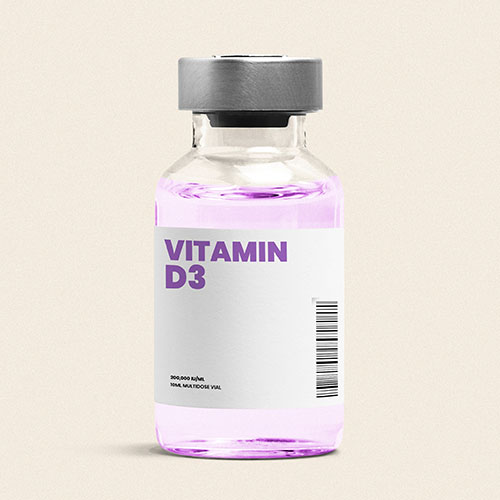vitamin D
What is Vitamin D?
Vitamin D injections offer various health benefits, particularly in cases where oral supplementation is insufficient or absorption issues exist.
What are the advantages to Vitamin D Treatment?
1. Rapid Correction of Deficiency
- Faster Replenishment: Vitamin D injections allow for quicker correction of vitamin D deficiency compared to oral supplements, as they deliver the vitamin directly into the bloodstream.
- Higher Potency: Since injections bypass the digestive system, they can deliver higher doses more effectively, which is useful for people with severe deficiencies or those who need rapid restoration of vitamin D levels.
2. Improved Bone Health
- Calcium Absorption: Vitamin D plays a critical role in calcium absorption, which is essential for strong bones and teeth. Injections can help maintain optimal levels, reducing the risk of conditions like osteoporosis and rickets.
- Prevention of Bone Disorders: Vitamin D injections can prevent bone disorders, especially in older adults who are at higher risk of fractures and bone loss due to low vitamin D levels.
3. Enhanced Muscle Strength and Function
- Prevention of Muscle Weakness: Vitamin D supports muscle function, and injections can help prevent muscle weakness, particularly in elderly individuals.
- Improved Physical Performance: Some studies suggest that vitamin D supplementation, including injections, can enhance physical performance and reduce the risk of falls by improving muscle strength and balance.
4. Support for the Immune System
- Boosts Immune Function: Vitamin D plays a significant role in regulating the immune system, helping to protect against infections, particularly respiratory infections like colds and flu.
- Autoimmune Disease Management: Injections may benefit individuals with autoimmune disorders (e.g., multiple sclerosis, rheumatoid arthritis) by modulating the immune response and potentially reducing disease severity.
5. Improved Mood and Mental Health
- Depression and Anxiety: Low levels of vitamin D have been linked to mood disorders like depression and anxiety. Injections may help alleviate these symptoms by quickly restoring optimal vitamin D levels.
- Seasonal Affective Disorder (SAD): Vitamin D injections can be particularly useful for individuals experiencing Seasonal Affective Disorder, which is linked to reduced sunlight exposure and lower vitamin D levels during winter months.
6. Cardiovascular Health
- Heart Disease Prevention: Vitamin D may have a protective effect on the cardiovascular system. Adequate levels of vitamin D are associated with lower blood pressure, improved heart function, and a reduced risk of heart disease.
- Reduction in Inflammation: Vitamin D has anti-inflammatory properties, and injections can help reduce systemic inflammation, which is linked to conditions like atherosclerosis and heart disease.
7. Support for Diabetes Management
- Insulin Sensitivity: Vitamin D is believed to enhance insulin sensitivity, which can help in managing blood sugar levels, particularly in people with type 2 diabetes.
- Reduced Risk of Diabetes: Some research suggests that maintaining optimal vitamin D levels through injections may reduce the risk of developing type 2 diabetes.
8. Cancer Prevention and Therapy
- Potential Protective Effect: Some studies suggest that vitamin D may help protect against certain types of cancer, particularly colon, breast, and prostate cancers, by regulating cell growth and reducing the risk of malignant cell transformation.
- Support During Cancer Treatment: In individuals undergoing cancer treatment, vitamin D injections may support bone health and improve immune function, potentially improving treatment outcomes.
9. Support for Individuals with Malabsorption Disorders
- Gastrointestinal Conditions: People with conditions like celiac disease, Crohn’s disease, or those who have undergone gastric bypass surgery often have difficulty absorbing vitamin D from food or oral supplements. Injections provide an alternative means of ensuring adequate vitamin D intake.
- Liver and Kidney Disorders: Individuals with liver or kidney disorders may have trouble converting vitamin D into its active form. Injections can help ensure proper vitamin D levels in these cases.
10. Skin Health and Disease Management
- Psoriasis and Other Skin Conditions: Vitamin D injections may help manage certain skin conditions, such as psoriasis, by modulating the immune response and promoting skin cell repair.
- Anti-Inflammatory Effects: Vitamin D’s anti-inflammatory properties can also improve skin health by reducing inflammation associated with chronic skin conditions.
11. Weight Management
- Potential for Weight Loss: Some research indicates that maintaining adequate vitamin D levels may support weight loss efforts, especially when combined with diet and exercise. Vitamin D may help regulate fat storage and energy metabolism.
12. Prevention of Chronic Diseases
- Multiple Sclerosis (MS): Vitamin D deficiency has been linked to an increased risk of multiple sclerosis. Regular injections can help reduce the risk or mitigate symptoms in individuals with MS.
- Alzheimer’s and Dementia: Emerging research suggests that vitamin D may have protective effects against cognitive decline and neurodegenerative diseases such as Alzheimer’s and dementia.
13. Long-Lasting Effects
- Less Frequent Dosing: Vitamin D injections, especially in high doses, can provide long-lasting effects, often requiring only one injection every few months. This is particularly beneficial for people who have difficulty maintaining daily or weekly oral supplementation regimens.

Risks and Considerations
While vitamin D injections have numerous benefits, some risks should be considered:
- Overdose Risk: Since vitamin D is fat-soluble, there is a risk of toxicity if too much is administered, leading to hypercalcemia (excess calcium in the blood), which can cause nausea, kidney damage, and other issues.
- Allergic Reactions: Rarely, some individuals may experience an allergic reaction to the injection.
- Monitoring Required: Regular blood tests are recommended to monitor vitamin D levels and avoid potential overdose, especially for high-dose injections.
Vitamin D injections should be administered under medical supervision to ensure safe and effective dosing.



